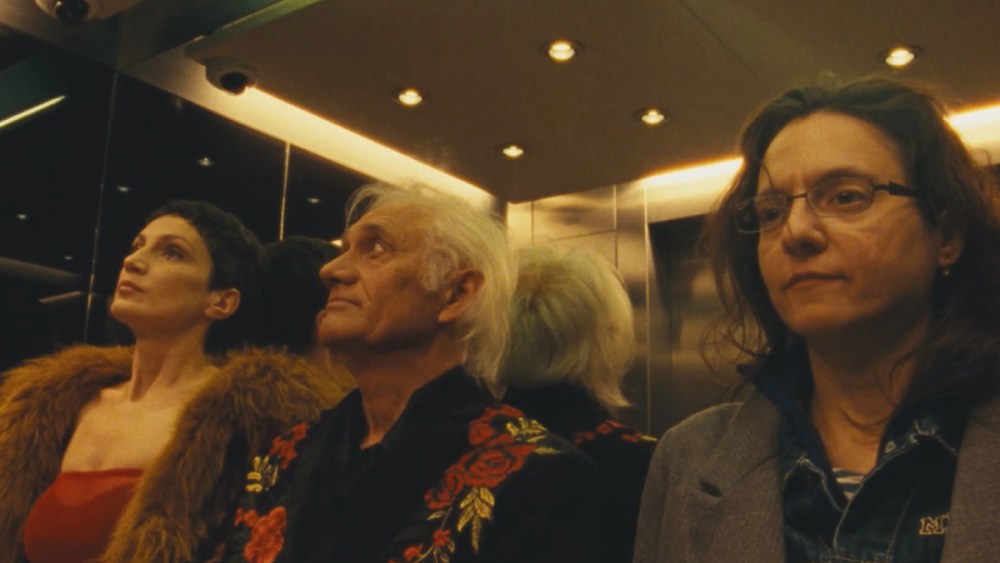Ivana Mladenović on Sex and Balkan Humor in ‘Sorella di Clausura’
Fresh off its world premiere in competition at the Locarno Film Festival, Romania-based Serbian director Ivana Mladenović’s riotous fourth feature, “Sorella di Clausura,” arrives at the Sarajevo Film Festival, where it will be competing for top honors at the long-running Bosnian fest.
The director’s latest, which she describes as an “empathetic parody of romantic melodramas,” stars a fearless Katia Pascariu (“Bad Luck Banging or Loony Porn”) as Stela, a prickly, cynical, love-sick anti-heroine hell-bent on meeting the object of her obsession: the aging Balkan pop star Boban, played by the director’s father, Miodrag Mladenović.
It’s a one-way romcom that sees Stela going to extreme lengths to pursue the schmaltzy silver fox, even as she scrambles to make ends meet while staring down the societal pressure to reproduce. Set in the Balkans on the cusp of the 2008 economic crisis, it’s a movie that the director says explores “the relation between sex and capital” while turning the familiar tropes of romantic comedies on their head.
“Even though the film plays with the structure of a melodrama or even a romcom, it’s of course not that,” Mladenović tells Variety. “At first we didn’t even think of it in those terms — a ‘subversive melodrama’ — but since the film is approached this way from a directorial point of view, I can understand the reference. Stela is definitely not a typical romcom character, and I think that’s great,” she adds. “It’s more than okay to create characters like Stela: complex, imperfect and very real.”
“Sorella di Clausura” is based on real-life events and dedicated to Anca Pop, a singer who starred in the director’s last feature, “Ivana the Terrible,” and who died tragically in a car accident while that film was nearing completion.
Mladenović met Pop in 2016 and felt an instant connection with the musician, who worked tirelessly to support underground artists in Romania. “She was an inspiration for a lot of things that I did,” the director says. “I admire what she was trying to achieve while living in a very judgmental environment.”
Pop came to Mladenović one day with a madcap manuscript that she was struggling to get published. It was written by a poor young woman named Liliana Pelici, from the provincial city of Timișoara, and charted her obsession with a famous pop star.
“The manuscript is so funny and so witty and…merciless,” says Mladenović, who worked with Momir Milosević and longtime collaborator Adrian Schiop to transform Pelici’s story into “Sorella di Clausura.” “What drew me in was the intensity of the narrative voice: a punk, edgy humor with merciless self-irony.”
Though very much a product of its historical moment, when “there was a small window of prosperity” in Romania that would soon come crashing down, the film has a keen understanding of what it means to cling to the margins — and to do so in a country that is itself hanging on for dear life on the fringes of the E.U.
“Even though [Stela] is holding on to her illusion…she’s quite in touch with what is going on with her and her position in society,” says Mladenović. “You could say that Stela is crazy, but look at the world.”

Miodrag Mladenović plays the aging Balkan pop star Boban.
Courtesy of Sarajevo Film Festival
“Sorella di Clausura” is Mladenović’s fourth film, following her debut documentary “Turn Off the Lights” (2012), which premiered at Tribeca, and her fiction features “Soldiers. Story From Ferentari,” a Toronto premiere in 2017, and “Ivana the Terrible,” which won the Special Jury Prize in Locarno in 2019.
Pic is produced by Romanian powerhouse Ada Solomon at microFILM and Mladenović through her Serbian shingle Dunav 84. It’s co-produced by Ines Vasiljevic and Stefano Sardo for Italy’s Nightswim and Bernat Manzano at Spanish production house Boogaloo Films. Paris-based sales and production outfit B-Rated International is repping world sales.
Following the film’s Locarno premiere, Mladenović says, several viewers described “Sorella di Clausura” as “an extension of ‘Ivana the Terrible,’” and the director’s latest certainly shares that movie’s caustic humor and barbed sensibilities. She describes it as “a bittersweet comedy of manners about people’s beliefs around sex in a country on the outskirts of the European Union,” though those manners are often in short supply.
The director credits co-writer Schiop for helping her hone the movie’s spiky tone and punk sensibilities. “He’s someone who has been researching working-class humor for years — especially in his novel ‘Soldier. Story from Ferentari,’ which we also adapted into a film,” says Mladenović. “This type of humor, ‘de autobază’ — what he likes to call ‘truck-driver humor’ — was already there in his earlier work. It’s rooted in the working class, where jokes are warm, imperfect and meant to create solidarity.
“While Romanian cinema in recent years has often used crude comedy to provoke the refined sensibilities of elites, we were determined not to play smart — not to wrap vulgar jokes in layers of post-ironic sophistication, but to keep them warm, imperfect and alive,” she says.
Vulgar jokes nevertheless abound in “Sorella di Clausura,” including what is likely to be one of the most talked-about not-quite-sex scenes to hit movie theaters this year. Did the director worry such over-the-top comedy might push the envelope a little too far?
“For us, ‘over-the-top’ would have meant pretending to be something we are not,” says Mladenović. “I think the fear of trying too hard was a big part of our debates, because we already had plenty of characters — we didn’t want to fail in presenting them simply as they are. Trying to make a ‘sophisticated’ film is not something you should expect from me and Adi,” she continues, “and we probably wouldn’t even know how to do it.”
Which isn’t to say there weren’t scenes that had to be left on the cutting room floor. “It’s just very hard to keep up with good taste — I mean, something that we are referring to as ‘good taste,’” the director says, laughing. “Balkan humor is such a tricky line to cross. In films it can so easily feel outdated, or slip into stereotypes — and then the films are reduced to that by default. We know how we’re perceived, so to still play with those ideas means walking a very thin line in how you approach it.”
The Sarajevo Film Festival runs Aug. 15 – 22.

